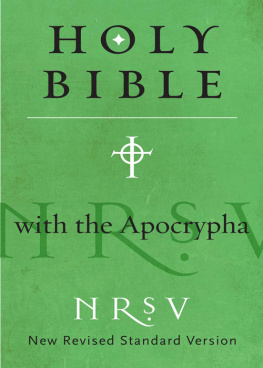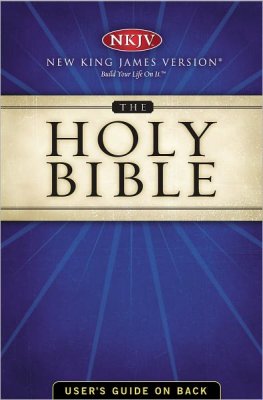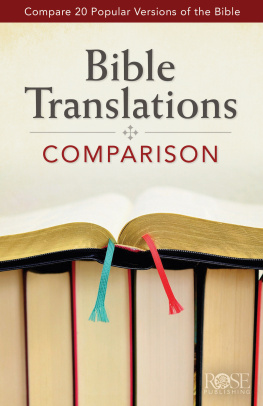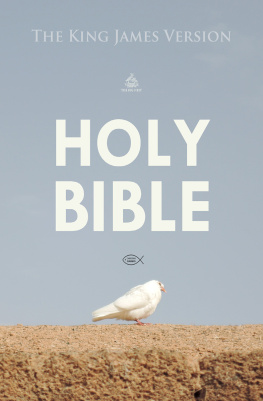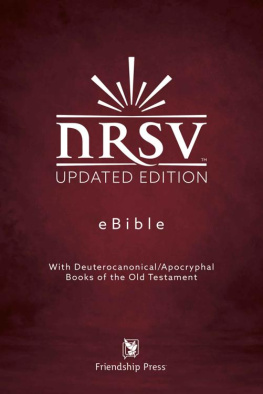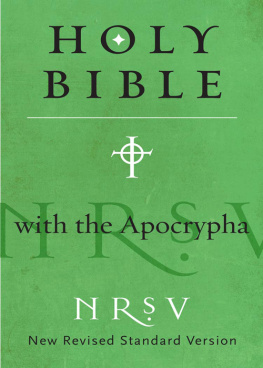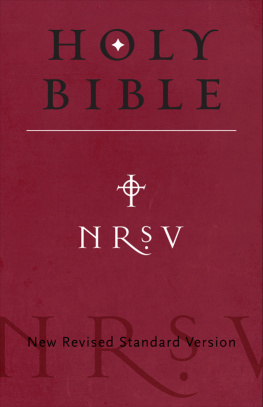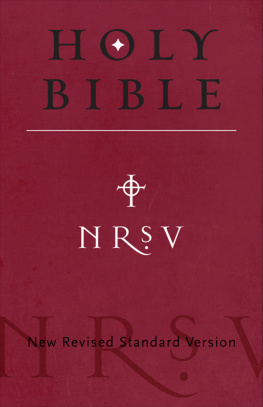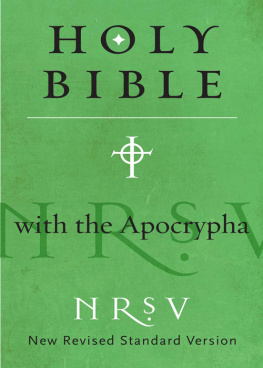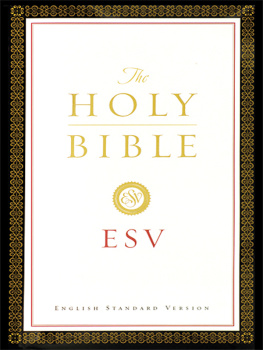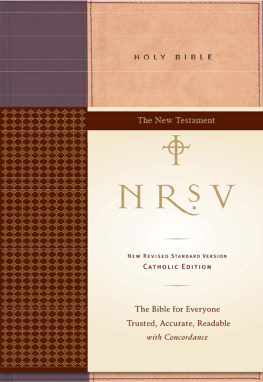The Holy Bible
NRSV
New Revised Standard Version
Catholic Edition

NEW REVISED STANDARD VERSION
CATHOLIC EDITION
Harper Bibles

An Imprint of HarperCollinsPublishers
Abbreviations used for the books of the OLD TESTAMENT:
| Gen |
| Ex |
| Lev |
| Num |
| Deut |
| Josh |
| Judg |
| Ruth |
| 1 Sam |
| 2 Sam |
| 1 Kings |
| 2 Kings |
| 1 Chr |
| 2 Chr |
| Ezra |
| Neh |
| Tob |
| Jdt |
| Esth |
| 1 Macc |
| 2 Macc |
| Job |
| Ps(s) |
| Prov |
| Eccl |
| Song |
| Wis |
| Sir |
| Isa |
| Jer |
| Lam |
| Bar |
| Ezek |
| Dan |
| Hos |
| Joel |
| Am |
| Ob |
| Jon |
| Mic |
| Nah |
| Hab |
| Zeph |
| Hag |
| Zech |
| Mal |
Abbreviations used for the books of the NEW TESTAMENT:
| Mt |
| Mk |
| Lk |
| Jn |
| Acts |
| Rom |
| 1 Cor |
| 2 Cor |
| Gal |
| Eph |
| Phil |
| Col |
| 1 Thess |
| 2 Thess |
| 1 Tim |
| 2 Tim |
| Titus |
| Philem |
| Heb |
| Jas |
| 1 Pet |
| 2 Pet |
| 1 Jn |
| 2 Jn |
| 3 Jn |
| Jude |
| Rev |
Abbreviations used in the text notes to the books of the OLD TESTAMENT:
| Ant. | Josephus, Antiquities of the Jews |
| Aram | Aramaic |
| Ch(s) | Chapter(s) |
| Cn | Correction; made where the text has suffered in transmission and the versions provide no satisfactory restoration, but where the Standard Bible Committee agrees with the judgment of competent scholars as to the most probable reconstruction of the original text. |
| Gk | Septuagint, Greek version of the OT |
| Heb | Hebrew of the consonantal Masoretic Text of the OT |
| Josephus | Flavius Josephus (Jewish historian, ca. 3795 CE) |
| Macc. | The book(s) of the Maccabees |
| Ms(s) | Manuscript(s) |
| MT | The Hebrew of the pointed Masoretic Text of the OT |
| OL | Old Latin |
| Q Ms(s) | Manuscript(s) found at Qumran by the Dead Sea |
| Sam | Samaritan Hebrew text of the OT |
| Syr | Syriac Version of the OT |
| Syr H | Syriac Version of Origens Hexapla |
| Tg | Targum |
| Vg | Vulgate, Latin Version of the OT |
T his Catholic edition of the New Revised Standard Version of the Bible has been authorized by the National Conference of Catholic Bishops in the U.S.A. and by the National Council of the Churches of Christ in the U.S.A. It has received the ecclesiastical approval of the Catholic Bishops of both the United States and Canada. The undersigned, who prepared this edition, is a member of the Revised Standard Version Bible Translation Committee as well as an active member and past president of the Catholic Biblical Association of America.
Roman Catholics are already familiar with the accuracy and elegance of the New Revised Standard Version, first published in 1990. It has previously appeared in two major types of edition: an edition of the Old and New Testaments alone, the Bible of most Protestants; and an edition of the Old and New Testaments with the Apocryphal/Deuterocanonical Books placed between the two Testaments. The text of the latter edition received the Imprimatur (official approbation) of the United States and Canadian Catholic Bishops. The New Revised Standard Version is truly an ecumenical translation, for it was produced by Roman Catholic, Eastern Orthodox, Protestant, and Jewish scholars. Because of this Catholic presence no change in the translation was requested for this edition. The only exceptions are the Book of Esther, which exists in two different forms that are explained below, and the Book of Daniel, which includes the deuterocanonical portions that are listed below.
Regarding the number of the books of the Old Testament canon and their arrangement, however, Protestants and Jews on the one hand, and Roman Catholics and Orthodox Christians on the other, hold different beliefs. From the time of the Reformation in the sixteenth century, Protestants have adopted the Jewish canon of the Old Testament, which was established by the rabbis at the end of the first century of the Common Era. This canon includes only those books that were written in Hebrew and Aramaic. In addition to these books, however, Roman Catholics, following the ancient tradition of the Christian church, also hold the Deuterocanonical Books of the Old Testament to be sacred and inspired, and therefore canonical. Protestants and Jews call these books Apocrypha, a word that means hidden or concealed, an inappropriate title for works that were part of the Greek Old Testament (the Septuagint) from pre-Christian times. The Roman Catholic canon, which was fixed by the time of the Council of Hippo in 393 and reaffirmed by the two Councils of Carthage in 397 and 419, was formally defined by the Council of Trent in 1546. This canon contains seven Deuterocanonical Books: Tobit, Judith, the Wisdom of Solomon, Sirach (the Wisdom of Ben Sira, also known as Ecclesiasticus), Baruch including the Letter of Jeremiah as chapter 6, and 1 and 2 Maccabees; and extra portions of two other books: the Additions to Esther; and the Prayer of Azariah and the Song of the Three Jews inserted between verses 23 and 24 of Daniel 3, Susanna as Daniel 13, and Bel and the Dragon as Daniel 14. Over and above these books and extra portions, the Bible of Greek and Slavonic Orthodox Christians includes 1 Esdras, the Prayer of Manasseh, Psalm 151, and 3 Maccabees. The Slavonic Bible also contains 2 Esdras, and an appendix to the Greek Bible includes 4 Maccabees.
Several of the Deuterocanonical Books were written originally in Hebrew or Aramaic, the rest in Greek. More than two-thirds of the Book of Sirach is now extant in Hebrew, and four fragments of the Book of Tobit in Hebrew and Aramaic were recovered from Qumran Cave IV. It seems certain that Judith and the additions to Daniel were also written originally in Hebrew. Hebrew is the original language of the prose parts of Baruch; the poetic parts were composed in Greek. The Wisdom of Solomon was written completely in Greek. The original language of 1 Maccabees was Hebrew while 2 Maccabees was composed in Greek.
The Book of Esther has two different forms: the short Hebrew original; and the longer Greek version that contains one hundred and seven additional verses comprising six distinct portions, A through F. It is the translation of the entire Greek version that appears in the Deuterocanonical section of the New Revised Standard Version. In this Catholic edition, however, the translation of the Greek portions has been inserted at the appropriate places of the translation of the Hebrew form of the book. Some of the Greek portions apparently had a Hebrew origin; the others were written in Greek.


